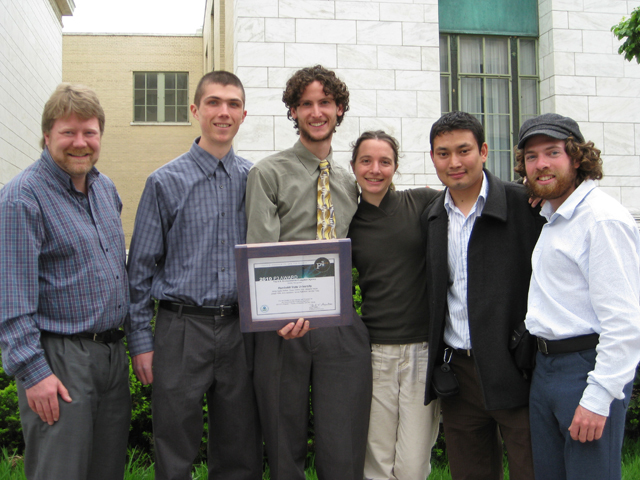
The winning HSU students garnered the maximum $75,000 at the National Sustainable Design Expo in Washington, D.C., sharing honors and more than $1 million in awards with Harvard, Clemson, Cornell, Drexel, Virginia Tech and Texas A & M, among more than 40 schools entered.
HSU's award will finance the installation of a low-cost, micro-hydroelectric system in the village of Rukubji, Bhutan, over a period of two years, in collaboration with local residents, the Bhutan Power Corporation and Bhutan’s Department of Energy. The project will evaluate the potential at village-level of GridShare technology. HSU students say it holds the promise of renewable energy mini-grids in thousands of communities worldwide.
The EPA competition, the sixth annual, is nicknamed the P3-Awards, for ‘People, Prosperity and the Planet” and marked the EPA’s 40th anniversary. The national competition encourages college students to create sustainable answers to worldwide environmental problems through technological innovations.
Based on a $10,000 phase-one prize it won last fall, the HSU team was a contestant in the Design Expo, April 24-25.
Humboldt State Environmental Resources Engineering Professor Arne Jacobson, faculty advisor to the Renewable Energy Student Union (RESU) and the P3 Project Team, said from Washington, “This is a wonderful testament to our students and richly deserved, because this project will make a real difference in people’s lives. I am so pleased the EPA recognized that, and I’m really proud of how our students presented themselves at the meeting here.”
Paul Anastas, assistant administrator for the EPA’s Office of Research and Development, said, “Sustainable innovations like the ones created by our P3 award winners are the environmental and economic future of our nation. In fields from agriculture to architecture to energy production, sustainability is the true north on the path ahead.”
Last fall, Jacobson’s undergraduate and graduate students used their initial $10,000 from the EPA to further the research and design of their project. It is a low-cost micro-hydroelectric system based on Smart Grid software logic which is programmed into a micro-controller. The team successfully designed, built and tested GridShare prototypes that shift electrical loads to offset brownouts. The GridShare device is designed for installation near the electrical meter of every house.
The technology encourages load shifting in two ways: it indicates the state of the grid to the user and prevents use of large appliances during brownouts.
Overall, the objective is to spur village consumers to ration their use of high-powered electrical appliances such as rice cookers and water boilers to periods of low demand. This would help to curb disruptive brownouts during peak hours of usage in early morning and evening.
“The students will make refinements to their device when they get back to campus, and in July three students will take a trip to Bhutan to begin laying the groundwork,” Jacobson said. “They will gather additional information and cement relationships with the villagers.”
Humboldt State’s P3 winners are Margaret Harper, a graduate student (2012) in energy environment and society, from Harrisonburg, VA; Joseph Hiller, an undergraduate senior in studio art (2012) from Fortuna, who previously pursued a degree in environmental resources engineering (ERE); Kyle Palmer, systems engineer and project advisor alumnus (’07 ERE), from Boulder, CO; James Robinson, IV, ERE undergraduate, December 2010, from Greeley, CO; Jennifer Tracy, graduate student in energy, environment and society, May 2010, Ravensdale, WA; James Apple, ERE undergraduate, May 2010, of Palo Alto; Nathan Chase, ERE undergraduate, May 2011, from Vancouver, British Columbia; and Chhimi Dorji, graduate student in energy, environment and
society, December, 2010, from Thimphu, Bhutan.
This is not the first time Humboldt State’s RESU has garnered national attention in the EPA’s P3 competition. In 2008, a seven-member team received an honorable mention after gaining a $10,000 phase one grant for a year-long wind monitoring project to test Humboldt County’s large potential for energy-saving wind farms.
In guiding the HSU project team, Jacobson and Schatz Energy Research Center Director Peter Lehman brought to bear more than 50 years of experience in the renewable energy sector, including Jacobson’s international research experience in multiple developing countries.